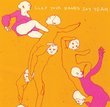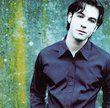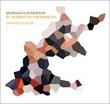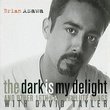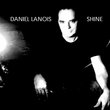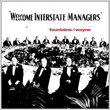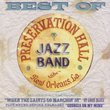| All Artists: Keith Jarrett Title: La Scala Members Wishing: 0 Total Copies: 0 Label: ECM Records Release Date: 1/25/2000 Genres: Jazz, Pop, Classical Styles: Modern Postbebop, Bebop Number of Discs: 1 SwapaCD Credits: 1 UPCs: 731453726826, 0731453726826 |
Search - Keith Jarrett :: La Scala
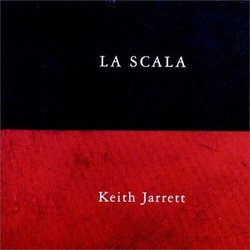 | Keith Jarrett La Scala Genres: Jazz, Pop, Classical
|
Larger Image |
CD DetailsSimilarly Requested CDs
|
CD ReviewsJarrett's Moorish fantasy Gavin Wilson | 07/02/2002 (5 out of 5 stars) "This is, as most of the other reviews say, an exquisite performance. After listening again and again to Jarrett's RARUM compilation, which must be this year's greatest jazz release, I have re-started purchasing Jarrett CDs.One aspect that startles me is the variety of music that appears on Jarrett's solo albums. While the PARIS concert takes its starting point from classical baroque -- at the time, Jarrett was in between recording the Goldberg Variations and the Well-Tempered Clavier -- LA SCALA seems to be largely a desert fantasy, a mix of Arabian and Spanish themes.'Part 1' begins in very different territory -- smoochy night-club piano music that touches on an incredible number of 20th century popular song classics. But at the heart of the 44-minute track is this haunting Moorish riff, which Jarrett solos over for several minutes.'Part II' seems to me strangely reminiscent of the cascading pianos on Return to Forever's 'Romantic Warrior', which is a weird connection to make, I know. Jarrett and Chick Corea played together for the Miles Davis band, but I'm not aware that they have worked together since or claim inspiration from each other.'Over the Rainbow' is a delightful way to end the concert -- entirely appropriate, even in an Italian setting, for a truly fantastic concert.My only gripe is that I cannot believe Jarrett's claim that the music is totally improvised. The whole of 'Part 1' seems so well-structured that it seems impossible to me that Jarrett hadn't at least doodled at home with many of the themes before committing them to a recorded concert performance. The very first two bars of music give a strong hint of the riff that will come 15 minutes later, even though that musical theme is discarded for much of the period in between. That on its own provides evidence to me of some detailed advance planning, even if the entire score hadn't been written out note-by-note beforehand.But who cares about that? All I'm saying is that this is as well played and well structured as a studio album, and in addition you get the ambience of the concert venue. Jarrett's recording could give live albums a good name!" Divinely Inspired JD Cetola | Omaha, NE USA | 08/13/2001 (5 out of 5 stars) "If this isn't divine inspiration at work, I don't know what is. Part I of this disc (all 45 minutes of it, but particularly the middle 20) is perhaps the most beautiful music ever recorded--and it was (amazingly) improvised. While some of the (unfortunate) trademark Jarrett grunting and moaning is present throughout the two improvised pieces, in Part I it almost seems necessary. The piece is that powerful, moving, and beautiful. Give it a listen if you don't believe me, but be prepared to have goosebumps. Part II is far more dissonant, but still incredible and at times as beautiful as part I. When you reach the end of these 73 minutes of improvised majesty, you almost need the stunning delivery of "Over the Rainbow" to bring you back down to Earth. And it is rendered as stunningly as I have ever heard.This disc is essential for all lovers of piano music--both classical and solo jazz. Very Highly Recommended." Masterpiece Daniel Sacilotto | Peru | 06/10/2005 (5 out of 5 stars) "Not too long ago I wrote that Koln had a special character that put it on a league of its own. Somehow, I've started to change my mind and slowly began to understand Keith's subsequent solo concerts much better. La Scala is a disc that deserves repeated listens, it takes you to the depths of Jarrett in his more mature solo playing, and with time you come to understand what it is that he was trying to do.
La Scala, much like Vienna, is a deeply disturbing album. The music goes to places of indescribable intensity, at times so powerful and overwhelming that it defies what can be considered 'good music'. The opening movement 'Part I' is the epitome of Jarrett's introspective playing. Even if it doesn't sound as constantly ingenious as Koln's first movement, the introspective effect of the music goes far beyond it. The first 15 minutes begin the piece with very beautiful romantic playing, slow and heartwarming. Towards minute 11 the music begins to acquire profoundness that almost scares in its beauty and honesty. Jarrett's darker moments go on for the next 25 or so minutes, where the improvisation lurks in a primitive, crude fashion. The music is not accessible, the same smashing keys on the piano are repeated unendlessly and the music rarely gives you an uplifting note. It goes, on the other hand, to a completely dark place, conflictive, unresolved. Keith seems to be struggling with his inner self and the music, fighting aggressively in an incredible dialog with the piano that is everything but 'listener-friendly'. It is not surprising to have a lot of people dislike the prolonged monotony of this section, but when internalized, its a completely unique experience. Keith alienates the listener, goes completely inwards into a world of musical forces that rage in a very powerful manner, perhaps the most powerful i've heard ever. Vienna and Paris share this same character in that they dwell deep into the more troubled side of Jarrett's soul. The beauty of this dialog, however, is truly understood when the last 10 minutes or so bring closure and resolution to the piece. Jarrett lands after this battle in a gorgeous lyrical conclusion that defies any skepticism towards his ability to improvise immediately heart moving music. The resolution brought forth by this last part unveils the deep meaning that underlies from the first minute for the piece as a whole. The conflict rests, and Jarrett is once again at peace. By the time this part has ended, you truly feel you've undergone a spiritual voyage that no 'composition', in the strict sense of the word, could possibly deliver. The contrast of darkness and light, conflict and resolution, angst and peace, is not only remarkable, but transcendental. It truly delivers the insight into Jarrett's soul he's been striving to accomplish since Bremen/Lausanne. Part two is a different dialog; abrupt, dissonant and chaotic. Whereas part one is a slow movement towards very definite spots, part 2 is an all out raging discussion. Delicate melodic lines are intertwined with chaotic, fast and atonal darker structures. Fast melodic tones then are put against dark, slow shades. There's a sense of fragility in this piece that makes it particularly interesting. The music at times moves and shifts from place to place so fast one feels the coherence of the whole dialog and the link between the music and the player is hanging from a very thin thread. Jarrett seems to do this deliberately, and amazes by never losing the grip of the dialog in its daring 25 or so minutes of duration. Its, again, a very intense and beautiful piece that requires our preconceptions of what is expected as music to be thrown and rather to embark on an undefined journey. Jarrett's music moves much like the spirit, in unpredictable ways than ultimately make absolute sense in their oscillating nature between tones, emotions and impressions. Part II shows the sense of the spirit's extremes, where the whole elastic structure of human sentiment and sense becomes pulled to its limit. The closing of 'Over the rainbow' is a soft, and beautiful landing into the world of the earthly, where we fail to acknowledge the depth that resides within the spirit. Its a beautiful, gentle landing that deserves praise in bringing closure to the journey. Overall, 'La Scala' proceeds in a very similar way to Vienna, and both concerts now stand firmly to me as the pinnacle of what sound, as a introspective experience, can teach you. It is a wonderful disc from a true genius that has an enormous gift. This disc deserves all the praise in the world. " |

 Track Listings (3) - Disc #1
Track Listings (3) - Disc #1
